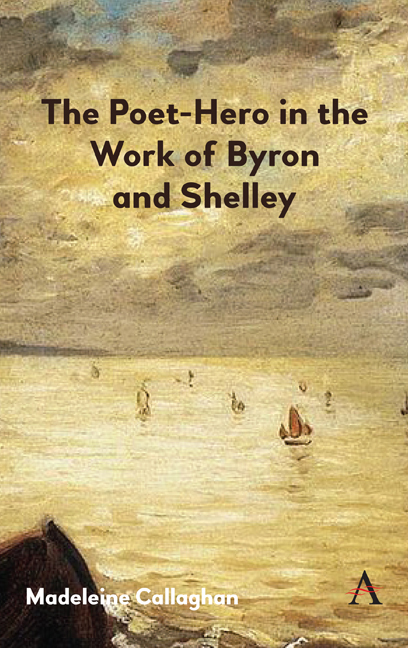Book contents
- Frontmatter
- Dedication
- Contents
- Acknowledgements
- Note on Texts and Abbreviations
- Introduction: The Poet-Hero: ‘Who shall trace the void?’
- Part I Byron
- Interchapter
- Part II Shelley
- Chapter Six ‘The Highest Idealism of Passion and of Power’: Shelley's Heroic Poetics in A Defence of Poetry, The Mask of Anarchy and Prometheus Unbound
- Chapter Seven ‘Holy and Heroic Verse’: The Revolutionary Poet-Heroes of Laon and Cythna
- Chapter Eight ‘This soul out of my soul’: The Trial of the Poet-Hero in Shelley's Epipsychidion
- Chapter Nine ‘His mute voice’: The Two Heroes of Adonais
- Conclusion The Byronic and the Shelleyan Poet-Hero
- Bibliography
- Index
Chapter Eight - ‘This soul out of my soul’: The Trial of the Poet-Hero in Shelley's Epipsychidion
from Part II - Shelley
Published online by Cambridge University Press: 30 March 2019
- Frontmatter
- Dedication
- Contents
- Acknowledgements
- Note on Texts and Abbreviations
- Introduction: The Poet-Hero: ‘Who shall trace the void?’
- Part I Byron
- Interchapter
- Part II Shelley
- Chapter Six ‘The Highest Idealism of Passion and of Power’: Shelley's Heroic Poetics in A Defence of Poetry, The Mask of Anarchy and Prometheus Unbound
- Chapter Seven ‘Holy and Heroic Verse’: The Revolutionary Poet-Heroes of Laon and Cythna
- Chapter Eight ‘This soul out of my soul’: The Trial of the Poet-Hero in Shelley's Epipsychidion
- Chapter Nine ‘His mute voice’: The Two Heroes of Adonais
- Conclusion The Byronic and the Shelleyan Poet-Hero
- Bibliography
- Index
Summary
Epipsychidion, one of Shelley's most difficult poetic enterprises, attempts to make a hero out of its poet. Shelley lays bare the stresses involved in the topic of heroism as it is the protagonist's deliberate straining to create and order the self and his universe that makes him heroic. Rather than occupying the position of legislator or prophet, Shelley creates a poet-hero defined by his romantic, even monomaniacal, quest to unite with Emily, despite the poem's all too clear-eyed awareness of the possible sophistry of such an attempt. Critics have paid a great deal of attention to Shelley's erotics and ‘the interdependence of language and desire’ in Epipsychidion, so this chapter focuses instead on Shelley's presentation of his poet-hero, who both quests towards and questions his goal. Northrop Frye's study of quest articulates it as ‘a sequence of minor adventures leading up to a major or climacteric adventure, usually announced from the beginning, the completion of which rounds of the story. We may call this major adventure, the element that gives literary form to the romance, the quest.’
Shelley's Epipsychidion dispenses with minor adventures, choosing to begin by plunging deep into the central test of the poet-hero, insisting on the importance of the ‘I’ figure. Readings of Epipsychidion have typically focused on the biographical, philosophical or literary genesis of the poem, from James Notopoulos's focus on the neo-Platonism of Epipsychidion, to Stuart Curran's emphasis on it as a Dantescan poem divorced from Shelley's experience, to Edward Bostetter's complaint about the ‘embarrassment’ of poet's intimate ‘weakness’. However, such emphases have overshadowed the poem's fascination with rendering a poet-hero that is heroic in an existential sense; he becomes a hero through the attempt to become a hero. The poet enacting rather than describing this process as he constructs a poem that self-consciously tests the limits of poetic creation distinguishes Shelley's Epipsychidion.
The poet's attempt to engage in this Dantescan pursuit of perfection by undergoing a purgatorial trial becomes the defining feature of the Shelleyan poet-hero.
- Type
- Chapter
- Information
- The Poet-Hero in the Work of Byron and Shelley , pp. 169 - 190Publisher: Anthem PressPrint publication year: 2019



